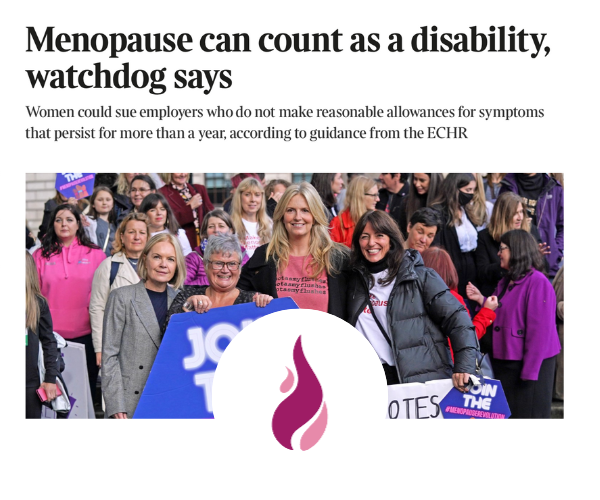Menopause Discrimination, Disability Rights & Employment Law

What Every Employer Needs to Know
Menopause is finally getting the attention it deserves. New guidance confirms that menopause can sometimes count as a disability under UK employment law. This means employers must take menopause seriously and support staff who are struggling. It also means women have stronger protection from menopause discrimination at work.
In this article, we explain what the law says, what employers must do, and how MenoHealth can help you create a supportive workplace.
What Is Menopause Discrimination?
Menopause is a natural stage of life, but the symptoms can make work much harder. Hot flushes, poor sleep, anxiety, brain fog and problems with concentration can affect confidence and performance. Many women also juggle caring responsibilities, which increases stress.
Right now, 4.4 million women in the UK workforce are peri-menopausal, menopausal or post-menopausal . Many of them report unfair treatment or a lack of support. This is menopause discrimination.
It can include:
- Managers misunderstanding symptoms
- Insensitive comments
- Lack of flexible working
- Performance management that ignores health issues
- Feeling pushed out or overlooked
Menopause discrimination can damage women’s careers. It can also lead to high staff turnover and loss of valuable experience.
Can Menopause Count as a Disability?
Yes. Under the Equality Act 2010, menopause can be a disability if symptoms:
- Last more than 12 months
- Have a significant impact on daily life
When this happens, employers must treat menopause as a disability. This means they must:
- Make reasonable adjustments
- Avoid discrimination
- Support the employee’s health and wellbeing
This area is now a growing part of menopause employment law. Employment tribunals are more willing to recognise the serious impact menopause can have. Companies that ignore this could face legal claims and reputational harm.
How Menopause Fits into Wider Legal Duties
Employers must also understand how menopause fits within wider workplace duties. Although menopause is not yet a protected characteristic, symptoms can still link to sex, age and disability discrimination.
This means line managers affected by the menopause — or managing menopausal staff — must handle conversations sensitively and fairly. If symptoms affect day-to-day activities, employers have a duty to consider reasonable adjustments.
Under the Health and Safety at Work Act 1974 (often called the Work Act 1974), employers must protect the health, safety and wellbeing of all staff, including those managing a menopausal woman’s health condition.
When organisations focus on raising awareness and encourage open and honest conversations, they can prevent misunderstandings that lead to poor performance reviews or unfair treatment. Without proper support, employers may face discrimination claims, so taking menopause seriously protects both the employee and the organisation.
Why Menopause Support Helps Employers
Supporting menopausal staff is the right thing to do and it also makes good business sense. Women aged 50–64 are a major part of the workforce, and losing them can harm productivity and team stability. The Chartered Institute of Personnel and Development says good support helps employers keep skilled, experienced staff .
Simple steps such as better conversations, understanding symptoms and offering flexibility can make a big difference. When women feel supported, they are more confident, engaged and able to stay in work.
How MenoHealth Helps Your Organisation
As menopause becomes more recognised in employment law, employers need practical support. MenoHealth offers award-winning menopause training and menopause workplace support. These programmes help organisations meet legal duties and build a positive, inclusive culture.
Here’s what MenoHealth offers, based on your workplace brochure:
1. Specialist Support Sessions
MenoHealth’s MenoTrainers deliver friendly, evidence-based sessions that explain symptoms and offer practical tips. Staff learn simple exercises they can do at home or at their desks. Sessions encourage open conversations and peer support. This helps remove the stigma around menopause and builds confidence across the team.
2. Training for Managers and Teams
Managers often worry about saying the wrong thing. Our accredited Menopause First Aid training helps staff to:
- Understand symptoms
- Talk openly and sensitively
- Make reasonable adjustments
- Support staff fairly
This builds a safer and more supportive workplace. It also reduces the risk of menopause discrimination.
3. Menopause First Aider CPD
The Menopause First Aider training gives staff the skills to support colleagues who are struggling. It teaches them how to listen, offer reassurance and signpost to professional help. The course takes six hours and provides accreditation. This creates long-term support inside the organisation and helps employers manage menopause responsibly and legally .
4. Tailored Programmes and Resources
MenoHealth can tailor sessions to your organisation’s needs. You get recordings, menopause-friendly exercise videos and a digital magazine full of helpful information so staff can access support whenever they need it .
Meeting Your Legal Duties With Confidence
Menopause discrimination is becoming more visible. Menopause disability claims are increasing. Employment tribunals are paying more attention to symptoms and their impact. Employers must act now.
The law is clear: if menopause affects someone’s daily life, employers must support them. With MenoHealth’s training and programmes, organisations can meet their legal duties and create a workplace where women feel safe, valued and able to perform at their best.
Final Thoughts
Menopause is a major workplace issue, and support is essential. Employers who understand menopause employment law and take proactive steps will create stronger, healthier and more inclusive teams. MenoHealth offers everything you need to support your staff, reduce risk and build a culture where every woman can thrive.
If you want to move from awareness to real action, MenoHealth is ready to help.